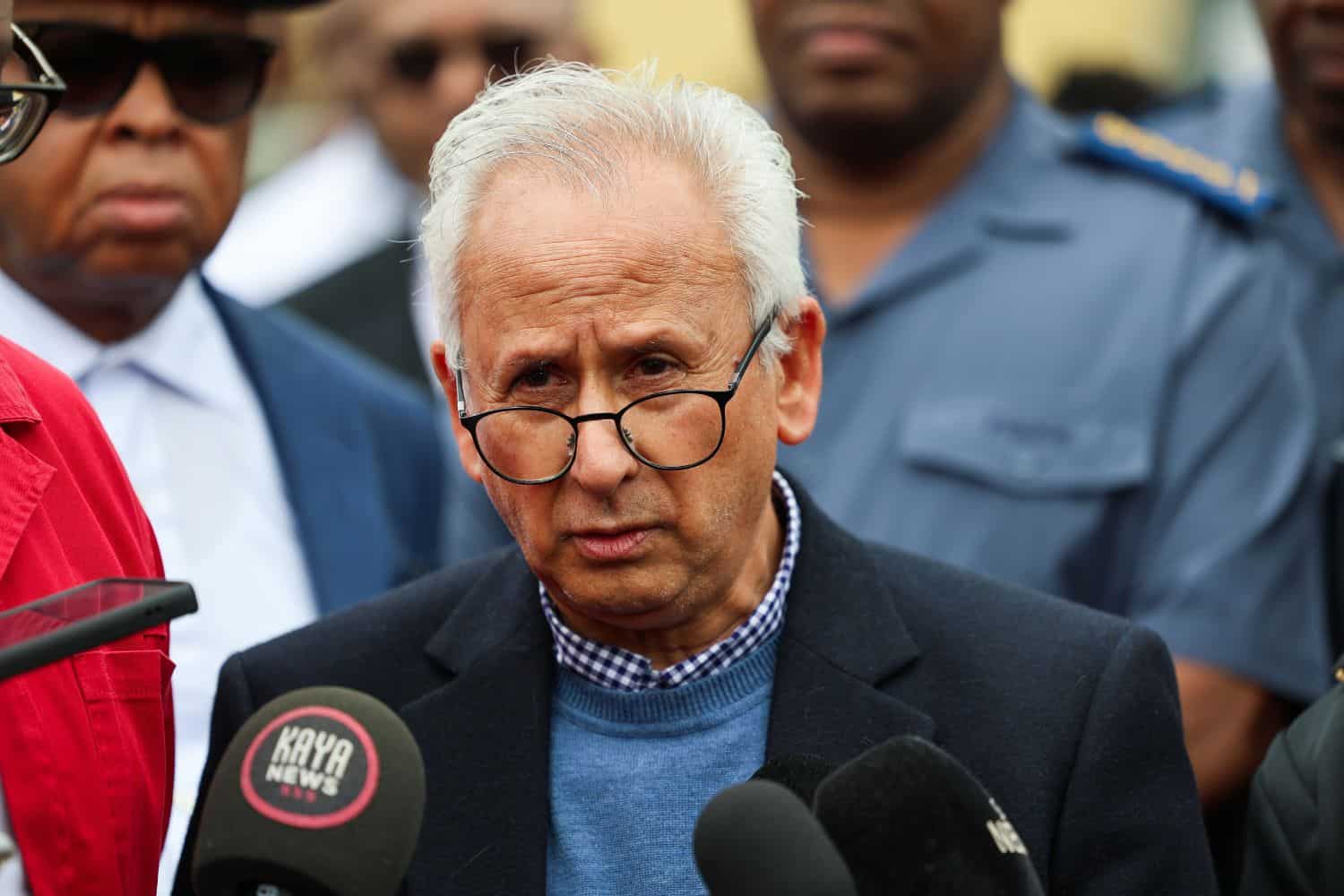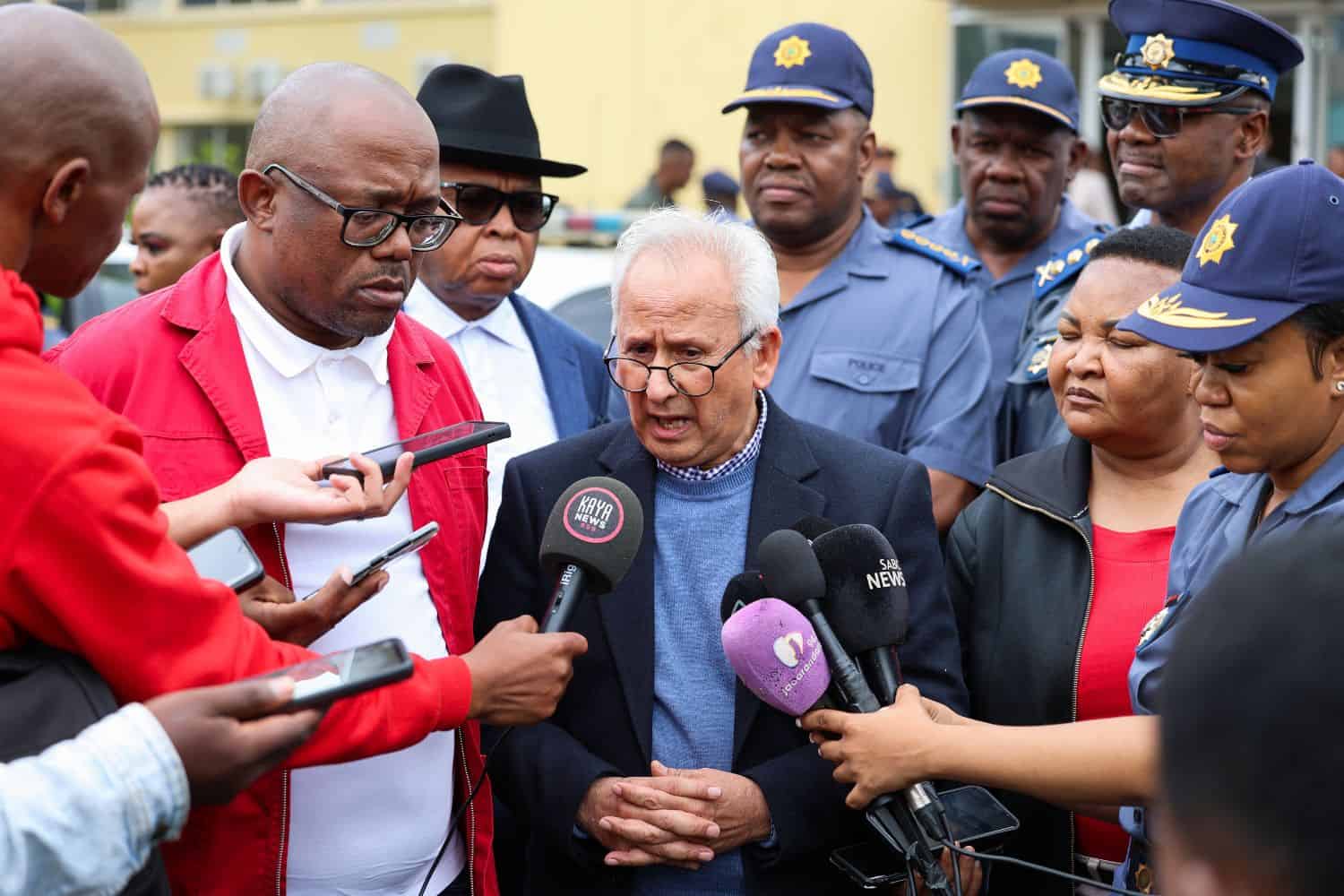'They're supposed to be in school,' the acting police minister said on Monday.

Acting Police Minister Firoz Cachalia has stressed the need for the police to be better equipped to confront gang violence, expressing alarm over the recruitment of young boys by criminal syndicates.
Cachalia, joined by his deputies Polly Boshielo and Cassel Mathale, met with the South African Police Service (Saps) leadership—including National Police Commissioner Fannie Masemola and Gauteng Police Commissioner Tommy Mthombeni—on Monday.
The meeting focused on addressing gang-related crimes in Gauteng following recent mass shootings in Westbury, west of Johannesburg, and Reiger Park in Boksburg.
In Westbury, two teenagers were killed, while five others were injured in a suspected gang-related shooting.
Six people were fatally shot in a drive-by incident in Reiger Park last week.
Joburg mayor calls for community support
Speaking to the media at the Johannesburg Metropolitan Police Department (JMPD) headquarters in Sophiatown, City of Joburg Mayor Dada Morero urged parents to guide their children away from criminal activity because boys as young as 13 are being drawn into organised crime.
Morero, however, highlighted that the municipality must also play its part by ensuring that sports and recreation facilities keep young people engaged and off the streets.
“Those facilities should be structured such that they are able to produce soccer players, netball players and swimmers.”
He also revealed that the City of Joburg’s drug action committee, which had been inactive, was recently revived.
“Now it’s in operation, it’s in the mayor’s office.
“We are now beginning to find other stakeholders to participate, so through that structure we can also look at what other programmes we should bring in those communities to fight the scourge of drug abuse and substance abuse.”
ALSO READ: More suspects arrested in Westbury and Reiger Park mass shootings
The mayor expressed confidence that more concrete results from the police would follow.
Morero rejected claims that the latest engagements were merely symbolic.
“We made the commitment as the City of Johannesburg to implement bylaws which we think will assist us in reducing some of the impact, dealing with shops that are not licensed because some of the substances come through that.”
He further indicated that police would conduct stop-and-search operations to reduce gun and drug activity but stressed community cooperation was also vital.
“Crime cannot be won by police alone. Communities must be part of it for us to win against gangsterism and drugs.
“It’s so unfortunate that the organised crime is now recruiting 12-year-olds to be distributing drugs, so it’s a serious problem.
“It’s bigger than we think. All of us must put our hands [together] and really, really fight this thing as much as we can.”
Police Minister concedes trust deficit
Cachalia also responded to complaints from some Westbury residents who were frustrated at not being invited to the stakeholder meeting, which included only selected community leaders.
He stressed that while the Westbury community was “well-represented” at the meeting, there remained a “trust gap”.
“We have to breach that trust gap because the community has a major role to play.
“Of course, where there’s high levels of violence and you’re dealing with organised crime, people are reluctant to come forward.
“They’re not prepared to testify in court, which makes it a little bit difficult to get convictions, but we have to fight this battle.”
READ MORE: Reiger Park shooting reignites calls for gun reform
The minister said the growing recruitment of boys aged 13 to 19 was especially troubling.
“They’re supposed to be in school; they’re supposed to be looking forward to a bright future, but unfortunately these communities are in a position where they feel marginalised.
“They feel that their issues around poverty, lack of opportunity and so forth are not being properly addressed.
“But that’s a problem across the country in all communities, although it’s difficult to make that case to specific communities.”
He insisted that the ministry and Saps leadership communicate their commitment to tackling crime.
The minister traced the roots of gang violence back several years.
“It goes back many decades, but it is now taking on a character that is very alarming because it involves the proliferation of guns. We’ve got to deal with that matter.”
Drugs and firearms at the core of the problem
Moreover, Cachalia emphasised that drug trafficking lies at the heart of the devastation facing many communities.
“We have to tackle this problem. That’s why I’m here, and I indicated to the community that we’re in this for the long haul. This is not a one-off meeting.”
He noted that Saps is reinforcing its response, with Masemola announcing new measures to strengthen anti-gang units.
However, Cachalia admitted that more still needs to be done.
READ MORE: ‘Declare gangsterism a crisis’ — crime experts warn
He said the Crime Intelligence and detective services divisions must improve their work to support “intelligence-driven policing”.
The minister emphasised that such an approach is essential because it is more targeted and focused.
“This is organised crime. It isn’t ordinary gang violence.”
When asked about deploying the South African National Defence Force (SANDF) to affected areas, Cachalia said he believed the matter remained one for the police.
“We need better targeted and focused strategies. I think the police are very good at high-visibility strategies, at deploying large resources across the country.
“In every community across this country, there is a police station; there are police officers fighting crime every day. We’re good at that.”

Revised strategy
Cachalia further explained that the anti-gang violence strategy had recently been revised after his visit to the Western Cape, a province deeply affected by gang violence.
“We have a revised strategy. It has a lot of different elements, and the government has allocated funding for the implementation of that strategy.”
He said the strategy is implemented in all four provinces where the gang violence is growing – which are Gauteng, the Eastern Cape, KwaZulu-Natal (KZN) and the Western Cape.
“The implementation of the strategy is going to require constant attention.
“We will have to monitor the implementation of the strategy and whether the strategy is achieving the results we’re hoping for.”
NOW READ: ‘We owe Westbury better’: Community on the brink of Cape Flats chaos
Support Local Journalism
Add The Citizen as a Preferred Source on Google and follow us on Google News to see more of our trusted reporting in Google News and Top Stories.








